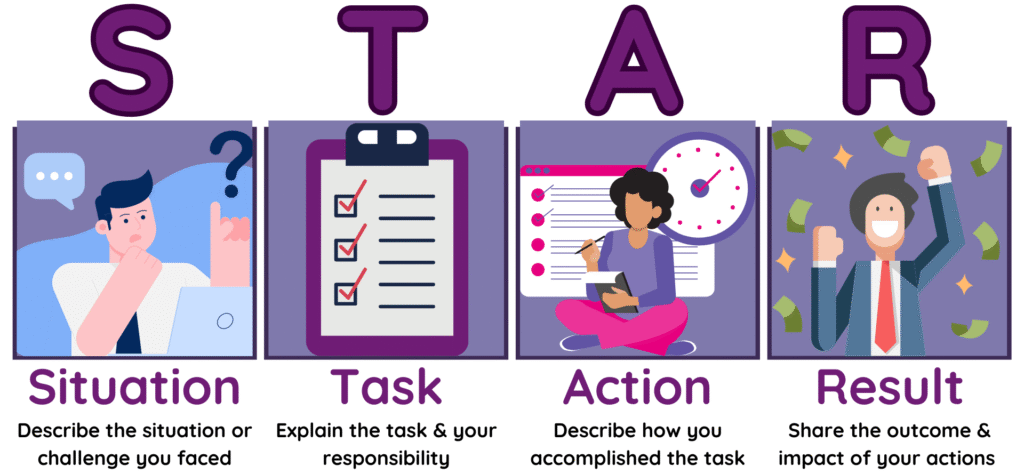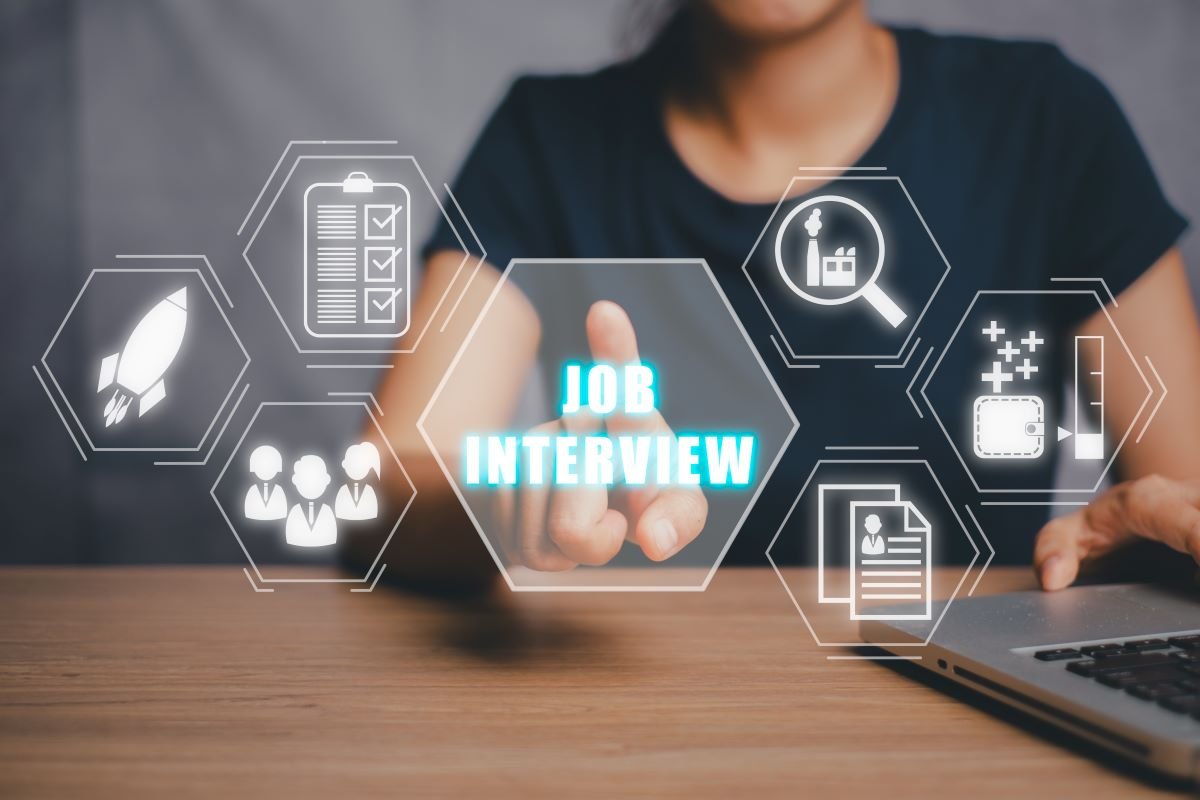
In an interview, you have to provide the most appropriate information regarding yourself in the shortest possible time. But there is a catch—if you are not cautious, your responses could become too long or too convoluted, so you end up losing direction or even put the interviewer to sleep.
What’s the STAR Technique?

STAR is an acronym for Situation, Task, Action, and Result. This is particularly effective in competency-based interviewing, when the intention is to illustrate particular skills such as teamwork, leadership, or organization. With STAR, you can tell telling stories about yourself that showcase your strengths.

Here is a brief summary of each component of the STAR technique:
1. Situation
:max_bytes(150000):strip_icc()/GettyImages-513251346-58ab07233df78c345bae2bbe.jpg)
To begin with, you will need to outline the situation you were in when you encountered the challenge. This may be from your previous work, university, or even extracurricular activities. The situation should be relevant to the competency you’re attempting to demonstrate and related to a specific time and location. Ensure you select a situation that is professional in nature and steer clear of technical industry words which could perplex the interviewer.
2. Task

Then describe the task or problem you needed to resolve. This might be anything from solving a problem to inventing something. Regardless of how basic or complicated, highlight why getting the task done was important and what would’ve happened if it wasn’t accomplished. Ideally, you’ll want to recount a task that’s universal enough to apply to many scenarios, not merely a specialized problem in one industry.
3. Action

Next, tell the interviewer about the action you took to resolve the issue. This is the most critical section—keep your focus on what you did, not your team. This demonstrates that you have the very skill the interviewer is seeking. Whether the answer was easy or hard, the important thing is that your actions meet the competency you want to show.
4. Result

Finally, explain the outcome of your actions. What happened as a result of your efforts? Make sure to highlight the positive results, showing how your actions contributed to solving the problem. The outcome should demonstrate your ability to deliver results and think creatively.
Example Answer for a Retail Position:

Situation:

During my last job at Aldi, I was tasked with restocking shelves with new stock to take the place of items which had exceeded their best-before date.
Late one evening, while I was restocking, more than 200 people entered the store at 6 a.m., and it overwhelmed the employees. I had to assist in handling the flow of customers while still stocking the shelves, because otherwise, customers would become frustrated with the absence of fresh produce.”
Action:

“To manage this, I phoned up a few volunteers from a nearby homeless shelter. I provided them with all the food that was past its best-before date if they assisted me in restocking the shelves. This enabled me to assist the cashiers and maintain order.”
STAR Question Answering Tips
![2025] Top Star Method for Interview Answers - Web Asha Technologies](https://www.webasha.com/blog/uploads/images/202407/image_750x_66a222dd0a4a4.webp)
1. Be Specific

When you write using the STAR method, steer clear of generic responses such as “I worked harder” or “things improved.” Actionable things, such as “I improved sales by 20%,” will get the interviewer’s attention. The more specific your metrics, the better.
2. Make It Relevant

If the question is leadership, give an example where you were a team leader. If it’s problem-solving, highlight a scenario where you applied creative thinking to solve a problem. The point is to ensure your example is specific to the competency being queried. Canned responses won’t awe anyone.
3. Timing Is Key

Avoid the temptation to speed through your responses in order to end the interview, though. Do not, however, make your response overly long. Ideally, you want to respond to each question in approximately 2-3 minutes. Keep it brief and on point.
4. Keep It Natural

While interviewers prefer to hear you utilize the STAR approach, they do not want to hear it come across as robotic or scripted. Share your story in your own words—like you are speaking with a friend. Use professional but approachable tone.
Lastly, don’t forget that practice is perfect. You can go to mock interviews or assessment centers in order to get practice and work on your answers. This will make you feel more confident and prepared for the actual thing!
More FAQs for Interview Preparation
How can mock interviews help me prepare for a real interview?
Mock interviews are a great way to simulate the real interview experience. They help you practice answering questions, improve your delivery, and become more comfortable with the interview process. Mock interviews also provide valuable feedback, allowing you to refine your responses and body language before the actual interview. Whether you do them with a friend, mentor, or through professional services, mock interviews are an effective way to boost your confidence.
What are assessment centers, and how can they help with preparation?
Assessment centers are used by many employers to evaluate candidates through various exercises, including group discussions, problem-solving tasks, and role-playing scenarios. They give employers a broader view of your skills, such as teamwork, communication, and problem-solving abilities. Participating in mock assessment centers can help you become familiar with the format and the types of tasks you may encounter, giving you a better understanding of what’s expected and how to succeed.
How can I improve my answers for common interview questions?
The key to answering common interview questions effectively is to be prepared. Practice answering questions like:
- “Tell me about yourself.”
- “What are your strengths and weaknesses?”
- “Why do you want to work here?”
To improve your answers, focus on being specific. Use the STAR method (Situation, Task, Action, Result) to structure your answers and give concrete examples. Tailor your responses to the job description and company culture. Also, practice out loud to improve your delivery and ensure you sound confident.
Should I rehearse my answers in front of a mirror or with someone else?
Both options have their benefits. Rehearsing in front of a mirror can help you assess your body language, facial expressions, and overall delivery. It helps you become aware of nervous habits, such as fidgeting or avoiding eye contact. On the other hand, rehearsing with a friend, family member, or mentor provides you with constructive feedback and allows you to practice thinking on your feet. Combining both methods is a great way to refine your answers and boost your confidence.
What types of questions should I ask during an interview?
Asking thoughtful questions during an interview shows that you are engaged and have done your research. Some great questions to ask include:
- “What does success look like in this role?”
- “What are the biggest challenges facing the team or company right now?”
- “How do you support employee development and career growth?”
These questions give you more insight into the role and company culture while also demonstrating your interest and preparation.
How can I work on my body language for interviews?
Body language plays a significant role in how you’re perceived during an interview. To improve your body language:
- Maintain good posture: Sit up straight and avoid slouching.
- Use open gestures: Avoid crossing your arms, as it can seem defensive. Instead, use hand gestures naturally to emphasize points.
- Make eye contact: It shows confidence and helps build rapport with the interviewer.
- Smile: A genuine smile can make you appear more approachable and friendly.
Practice in front of a mirror or with a friend to make sure your body language aligns with your verbal communication.
How can I deal with nervousness before an interview?
Feeling nervous before an interview is completely normal, but there are ways to manage anxiety:
- Prepare well: The more you practice and know about the company and role, the more confident you’ll feel.
- Breathing exercises: Deep breathing can help calm your nerves and refocus your mind.
- Positive visualization: Imagine yourself succeeding in the interview. This can reduce anxiety and boost your self-confidence.
- Remember it’s a conversation: Shift your mindset from “I need to perform perfectly” to “I’m having a conversation about how I can contribute.”
How do I research a company effectively before an interview?
Effective research involves going beyond the company website. Start by:
- Reading their mission and values: Understand what drives the company and how you align with their goals.
- Looking at recent news: Check for any major developments or news related to the company.
- Exploring their social media: Companies often post updates, culture insights, and events on social media platforms.
- Reading employee reviews: Websites like Glassdoor can provide an inside look at the company culture and employee experiences.
What should I wear to an interview?
Your attire should reflect the company’s culture and the role you’re applying for. For most interviews, it’s safe to wear business casual or professional clothing. If the company has a more relaxed culture, business casual may be appropriate. Make sure your clothes are neat, well-fitted, and professional. Pay attention to grooming, and avoid excessive accessories or strong fragrances. When in doubt, it’s always better to be slightly overdressed than underdressed.
What should I do if I don’t know the answer to a question during the interview?
It’s okay if you don’t know the answer to every question—what’s important is how you handle it. You can:
- Stay calm: Don’t panic. Take a moment to gather your thoughts.
- Be honest: If you don’t know the answer, say so, but express your willingness to learn and how you would go about finding a solution.
- Turn the question into a discussion: If the question is unfamiliar, offer related knowledge or skills that demonstrate your ability to adapt or solve problems.
Conclusion
The key to acing an interview lies in practice and preparation. Participating in mock interviews, practicing your answers, improving your body language, and doing thorough research on the company will help you feel more confident and ready. Don’t forget that interviews are a two-way street—by asking insightful questions, you show your genuine interest in the company and the role. With a little effort and the right mindset, you’ll be ready to tackle any interview with confidence and poise!






